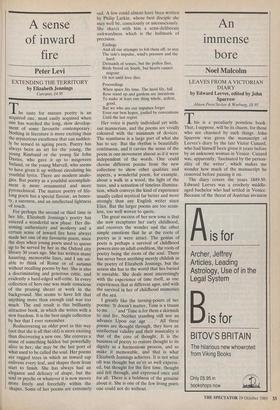A sense
of inward fire
Peter Levi
EXTENDING THE TERRITORY by Elizabeth Jennings
Carcanet, £4.95
The taste for mature poetry is an acquired one, most easily acquired when one has watched the long, slow develop- ment of some favourite contemporary. Nothing in literature is more exciting than the mysterious excellence that can sudden- ly be sensed in ageing poets. Poetry has always been an art for the young, the Young Rimbaud or the young Sir John Davies, who gave it up to misgovern Ireland, or the young Marvell, who seems to have given it up without circulating his youthful lyrics. There are modern analo- gies. But poetry as a youthful accomplish- ment is more ornamental and more pyrotechnical. The mature poetry of life- long poets has a special flavour, an hones- ty, a sureness, and an intellectual lightness of touch.
For perhaps the second or third time in her life, Elizabeth Jennings's poetry has entered a wonderful new phase. Her dis- arming authenticity and modesty and a certain sense of inward fire have always made her one of my favourite poets, since the days when young poets used to queue up to be served by her in the Oxford city library 30 years ago. She has written many haunting, memorable lines, and I am un- able to think of Rome or of autumn without recalling poems by her. She is also a discriminating and generous critic, and evidently a hard-edged self-critic. In every collection of hers one was made conscious of the pruning shears at work in the background. She seems to have felt that anything more than enough said was too much. The end result is this brilliantly attractive book, in which she writes with a new freedom. It is the best single collection by her that I ever remember.
Rediscovering an older poet in this way (not that she is all that old) is more exciting than discovering a new one. She conveys a sense of something hidden but powerfully alive in her; she may be the last poet of what used to be called the soul. Her poems are rugged trees in which an inward sap enlivens every leaf, and shapes them from start to finish. She has always had an elegance and delicacy of shape, but the soul or psyche or whatever it is now moves more freely and forcefully within the shapes. Some of her poems are extremely sad. A few could almost have been written by Philip Larkin, whose best disciple she may well be, consciously or unconsciously. She shares with him a semi-deliberate awkwardness which is the hallmark of precision.
Endings And all our attempts to fob them off, to stay The tide's impulse, wind's pressure and the hard Demands of senses, but the pollen flies, Birds brood on South, but hearts cannot migrate Or not until love dies.
Proceedings When space fits time. The lucid lily, full Rose stand up and gardens arc intentions To make at least one thing whole, ardent, good, But we who are our impulses forget Even our best hopes, jostled by conventions Until the last regret.
Her voice is purely individual yet with- out mannerism, and the poems are vividly coloured with the minimum of devices. The scantiness is a large part of what she has to say. But the rhythm is beautifully continuous, and it carries the sense of the poem in one movement almost as if it were independent of the words. One 'could choose different poems from the new collection to show other qualities and aspects, a wonderful poem, for example, about a walk in a wood, the light of the trees, and a sensation of timeless illumina- tion, which conveys the kind of experience usually called mystical far better and more strongly than any English writer since Eliot. But the larger poems are too seam- less, too well woven to quote.
The great success of her new tone is that she now recaptures her early childhood, and recovers the wonder and the other simple emotions that lie at the roots of poetry as it were intact. The genius of poets is perhaps a survival of childhood powers into an adult condition, the roots of poetry being the roots of the soul. There has never been anything merely childish in the poetry of Elizabeth Jennings, but the access she has to the world that lies buried is enviable. She deals most interestingly with the experience of time itself, as one experiences that at different ages, and with the survival in her of childhood memories of the sea.
I greatly like the turning-points of her poems: 'It doesn't matter, Time is a truant to me . .' and 'Time is for them a skirmish to and fro, Neither standing still nor an advance Upon our age .' All these poems are thought through, they have an intellectual validity and their musicality is that of the core of thought. It is the business of poetry to restore thought to its dignity as a harmonious process, and so make it memorable, and that is what Elizabeth Jennings achieves. It is not what oft was thought but never so well express- ed, but thought for the first time, thought and felt through, and expressed once and for all. There is a boldness of the genuine about it. She is one of the few living poets one could not do without.


















































 Previous page
Previous page